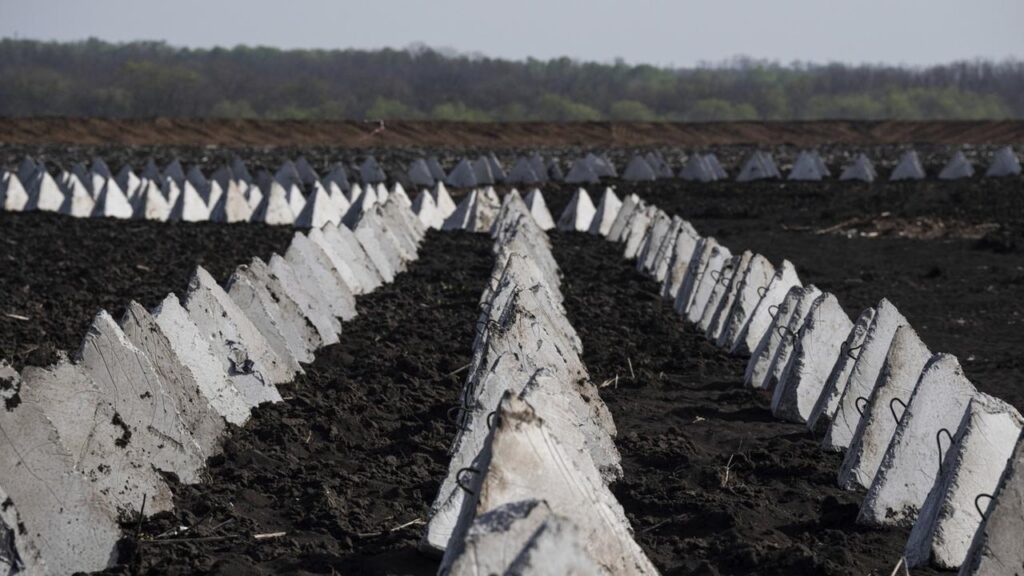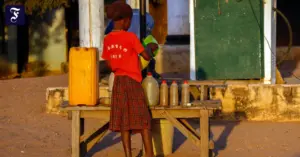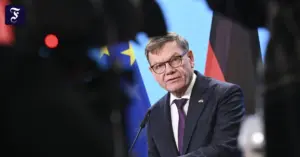
Russia demands that Ukraine leave occupied and unconquered territories. The move is also being debated in the context of recent plans to end the war. But is this in accordance with international law?
Decision on Ukraine without Ukraine? A peace agreement providing for the handover of territory can only exist if Ukraine agrees – this was emphasized by Pierre Thielbörger, professor of international law at Ruhr University in Bochum. Ruling Ukraine is legally unthinkable. But would international law allow Ukraine to reluctantly agree to surrender its territory in exchange for a halt to Russia’s massive offensive and a peace agreement?
In principle, a country can give up its own national territory, said legal expert Thielbörger. Approval of such a peace agreement must be “a lawful and, most importantly, voluntary act of the Ukrainian government.” In particular, this should not happen under stress.
In international law, an agreement is basically void if it is carried out with violence or the threat of violence. “States that commit violence should not receive any contractual benefits from that violence,” stressed the international law expert.
Given Russia’s massive military offensive, surrendering territory is unlikely. Because it’s hard to talk about volunteerism when Ukraine is being bombed.
Which is invalid Peace treaty?
A peace agreement between Ukraine and Russia that also includes surrendering territory “will probably be considered void in its entirety,” Thielbörger said. However, that does not mean there is no peace agreement at all.
The provisions of such an agreement, which refer to the “cessation of hostilities”, namely the ceasefire and its security, can apply automatically. Because Russia has an “obligation to end aggression”. However, the regulations governing the transfer of territory are invalid.
At the moment it is difficult to say for sure how the situation in Ukraine must develop in order for us to talk about a voluntary surrender of territory on the basis of international law. Should there be a stable ceasefire, effective security guarantees from the US and Europe, or confidence-building measures from Moscow?
The question then is what happens if there is peace and the current front lines are frozen. Will Ukraine and the international community then recognize the occupation carried out by Russia, not legally, but in reality? And could this lead to legal recognition at some point?
Such de facto recognition is always a difficult question of demarcation, says Pierre Thielbörger. “If Ukraine then actually recognizes and implements the peace agreement it was forced to make, then that could change its legal meaning.” But this also depends on whether Ukraine voluntarily recognizes the new situation.
The only thing that is certain at the moment is that Russia’s violent airstrikes against civilian targets do not represent a decision-making situation in which Ukrainian President Volodymyr Zelenskyj’s government is acting of its own accord.
the consent of the population itself
Besides the absence of coercion, there is another aspect: When taking decisions about a country’s territorial integrity, the role of the affected population must also be taken into account, stressed international law professor Thielbörger. There are differing views regarding international law, but some international lawyers argue that citizens of affected countries must always agree to surrender their national territory.
The Ukrainian constitution also states that there must be a vote by Ukrainian citizens if Ukraine’s national territory is to be changed. Likewise, handing over Russian-occupied territory would likely require an amendment to Ukraine’s constitution. Article 133 paragraph 2 defines the territory of Ukraine and explicitly lists the four regions of Luhansk, Donetsk, Zaporizhia and Kherson.
The legal situation in Ukraine does not play a role at the level of international law and in the question of whether Ukraine can effectively renounce its territory under international law. But politically, any peace settlement must take Ukraine’s constitutional law into account – because a peace agreement must be acceptable to the Ukrainian people.
Who does the occupied territory belong to
Russia, in turn, annexed Crimea and the four administrative districts of Luhansk, Donetsk, Zaporizhzhia and Kherson and designated them in the constitution as part of the national territory. The Kremlin cited, among other things, the votes on the accession of the occupied territories to the Russian Federation, which took place in Crimea in 2014 and in eastern and southern Ukraine in 2022.
However, for international law experts, this is a fake vote that is not in accordance with international law. Residents cannot vote freely, and in the Russian-occupied territories there is a “system of violations” of human rights at the time of the “referendum”, as noted by the European Court of Human Rights in its decision in July 2025.
The UN General Assembly also confirmed several times that referendums in Crimea and in eastern and southern Ukraine were illegal.
After all, Russia recognized Crimea as part of its neighbors under an international agreement with Ukraine in 2003, law professor Thielbörger recalled. And he was referring to a promise the two countries made to each other in 1997 – namely to respect each other’s borders.)
Limitations of The right to self-determination
Russia, on the other hand, has repeatedly justified its occupation policy by saying that people in the occupied territories want to leave Ukraine. This is included in the right to self-determination of a nation. From an international law perspective, this argument is untenable.
Thielbörger explains that the right to self-determination allows people to freely determine their political, economic and cultural development. However, a distinction must be made between internal and external self-determination rights.
Internal self-determination means that national minorities enjoy special protection in their parent country, manifested, for example, in self-government or in the protection of their culture and traditions.
However, external self-determination, that is, secession from the mother country, is only possible in very exceptional cases, Thielbörger stressed. A nation must be systematically oppressed and suffer serious human rights violations in order to secede.
Here too, the Russian argument does not apply. There were no serious legal violations committed by the Ukrainian government either in Crimea or in eastern and southern Ukraine.






